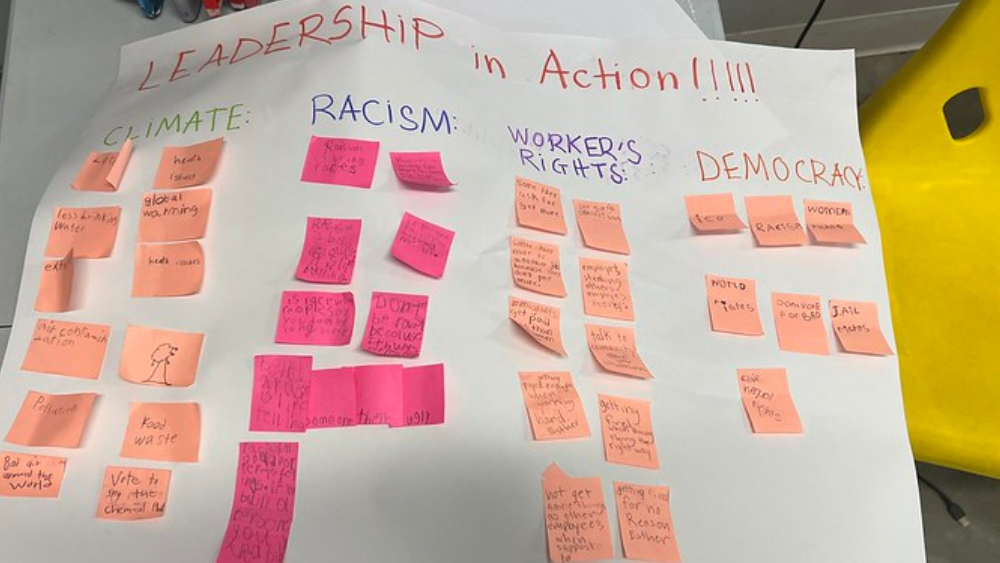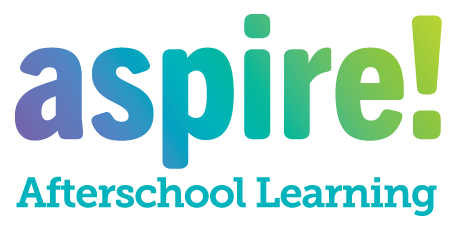A Day Dedicated to Education

Written by Paula Fynboh, Executive Director
The “opportunity gap” is such a big topic. Many reports and books have been written about it, and yet it continues to grow. Aspire leveraged “Education Day” on March 20 to bring attention to the opportunity gap, and more importantly, what can be done to close it and why it matters.
I started the day by facilitating a panel discussion with educational leaders Anna Faulkner (Program Director, Aspire Afterschool Learning), Gaby Moore (Program Manager, Aspire Afterschool Learning, Gabriella Rodriguez (Assistant Director of Pre-College Initiatives, George Mason University), and Zuraya Tapia-Hadley (Board Member, Arlington Public Schools). Their conversation covered everything from the trends we’re seeing in Arlington to misconceptions about the opportunity gap and the good work that different sectors are doing to close that gap, as well as questions from community members about how they can help.
Gaby Moore shared, “Even though our students are facing a lot of different challenges that are outside of their control, they have a lot of strengths that they are bringing to the table. They’re creative, they’re funny, they’re hardworking, they’re resilient above all… It’s really important to reframe our thinking and recognize the potential and possibilities that every student has regardless of their background or the circumstances around them so we’re really aiming to help our kids grow those strengths and reach their full potential. Because they really are capable of remarkable things.”
Throughout the day, I served as Faculty and Guest Lecturer for Leadership Center of Arlington’s Education Day, a day that brought together Arlington business, government, and nonprofit leaders. These leaders ended their day by working alongside Aspire’s students, exploring the characteristics of a leader in students and adults alike, and committing to bring their leadership skills into action by working together to solve some big problems facing our communities today.
This activity not only brought students into conversation with local community leaders, it provided an opportunity for these leaders to hear and learn from our students. Students’ ideas for how they could make change included leading by example, voting for policies they support once they’re old enough, raising awareness of these issues in their schools and friend groups, using their voices to advocate for what they want, talking to community groups, and sharing their own stories of how these issues have an impact.
Lisa Fikes, President and CEO of Leadership Center of Arlington, said “We are incredibly grateful for our continued partnership with Aspire. Our community is stronger when we all have a chance to listen and learn from one another. For the Lead Class of 2025, the experience was a wonderful reminder of that truth as well as a glimpse into the magical world of Aspire’s mission, work, and amazing youth!”
Conversations like the above are crucial in closing the opportunity gap. Every presentation on March 20, from the panel to multiple Leadership Center of Arlington speakers, spoke of the numerous societal, structural, and systemic issues that built and continue to contribute to the opportunity gap, as defined as the unequal distribution of resources and opportunities that lead to lower educational aspirations and attainment for certain groups of students based on factors like socioeconomic status, race, or ethnicity.
One of the common threads in every presentation and from each panelist was that society has different expectations around the learning and performance of low-income Black and Latinx students. Some of the factors contributing to this include teacher bias, a lack of representation in teachers and administrators, and structural inequities such as fewer resources that result in higher student-to-teacher ratios and fewer educational opportunities.
Lowered expectations can too often become self-fulfilling prophecies. Students often perform to the expectations we set for them, which is why Aspire sets high expectations for our students. From our revamped structured literacy curriculum, critical thinking Project-Based Learning opportunities, asset-based programming, and the opening of our soon-to-be Makerspace, we nurture Aspire students and support them in becoming all they Aspire to be. This is critically important, not only for our students and families but for all of us. When it comes to education, a rising tide truly lifts all boats.
I’ll never forget one of the first students, Sophia, whom I met when joining Aspire as the CEO/Executive Director almost four years ago. Sophia loved learning, especially science. She came into my office at least once a week and told me about something she learned in the Aspire science guild, including how worms build healthy soil for plants. What if Sophia has the solution to solve climate change, but begins to lower her expectations and imagination about what is possible for her because of overt and covert messages about what she is capable of? If that’s the case, we all lose. And we lose big.
Leadership Center of Arlington’s leadership exploration with our students is just one example of how we turn expectations on their head in exploring what leaders look like, who can lead, and the characteristics of a leader. Through community partnerships like this, we continue to lift the tide, teaching our students and government, corporate, and nonprofit leaders alike that when we dream and expect big of our students, regardless of what side of the opportunity gap they fall, we all win.
